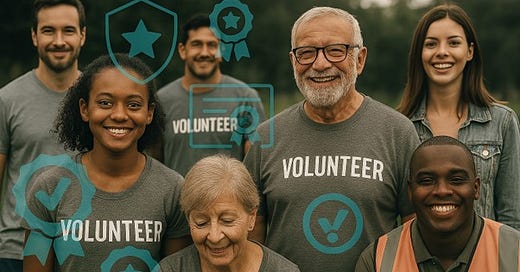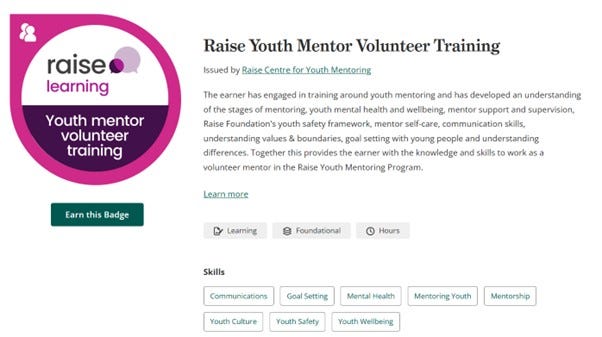No Paycheck, No Problem—But Can I Get a Credential?
Exploring how community service builds skills—and why we need to start recognising them properly.
Recognition Where It’s Overdue: Why Volunteer Skills Should Count
We talk a lot about recognising learning. But what about the skills people gain through volunteering, community leadership, or unpaid caregiving? These roles build real capability—but they rarely show up on a resume. Too often, people learn through service, and then start from scratch when they try to move forward.
Gilbert Kruidenier is one of those people, I’ve known Gilbert for many years and he has always being volunteering so I asked Gilbert to share his experiences. He’s volunteered with everyone from the SES to the Red Cross to the Change Management Institute. His roles have ranged from storm response and community education to mentoring, organising, and leading teams. But when he moved interstate and joined a similar emergency services organisation, most of his experience was overlooked. He ended up repeating training he’d already done—and eventually, left. The lack of recognition wasn’t just frustrating. It eroded his motivation.
“How many trees do I have to cut up, how many roofs must I climb, or how many sandbags should I fill before I’m considered ‘good people’?”
Why Volunteer Skills Matter
Volunteering isn’t just about showing up. It’s about showing leadership, learning under pressure, making decisions, and serving your community. Gilbert’s experience spans everything from logistics and coordination to community education, trauma response, mentoring, and public engagement. Those are the same capabilities people spend thousands developing in professional development programs.
“Those are 100% transferable skills for my change profession… coaching, mentoring, comms, victim support, community engagement.”
But instead of building momentum, Gilbert’s moves between roles often meant starting again. In SES Victoria, he’d become a team leader with 600 jobs under his belt. In SES Queensland, none of it counted.
“There are transferable qualifications, but sometimes it’s easier to just redo the training for compliance and insurance reasons. I essentially redid all my training from Victoria, which felt like a waste of time on less optimistic days.”
That experience took its toll—not just on efficiency, but motivation and he left SES QLD.
“Leaving SESVIC physically hurt. It was such a part of my life… I wanted to keep the memory of ‘my time in orange’ to be a good one and not see it fizzle out in QLD.”
What Recognition Looks Like in Practice
Some organisations have already understood this and are leading the way in making volunteer skills visible and portable:
Raise Foundation (Australia) issues digital badges to youth mentors through Credly. These aren’t just thank-you notes—they’re metadata-rich credentials volunteers can add to resumes, email signatures, or LinkedIn profiles. They show what the volunteer did, what they learned, and how it was assessed.
View the full badge here.
Community Emergency Response Teams (CERT) in the US issue digital certifications through Merit, making emergency response skills visible across agencies. For volunteers like Gilbert, that kind of visibility could mean the difference between starting again or building on what they’ve already done.
In both these cases, the credentials don’t just reward participation. They communicate value and give people something they can take with them that’s more than just a warm fuzzy feeling from doing good.
Who Benefits—and Why It Matters
The benefits of credentialing volunteer skills are broad:
For individuals: Confidence, proof, and portability. Volunteers gain formal recognition for their real-world capabilities—and a way to connect that learning to employment or further study.
For organisations: Stronger retention, better reporting, and deeper engagement. When volunteers see their development being recognised, they’re more likely to stay and contribute meaningfully which matters as volunteer numbers decline worldwide.
For society: A more inclusive view of what counts. When we recognise the full spectrum of learning—including service—we create more entry points for lifelong learners and undervalued talent.
“I've never been one for accolades… but there’s something to say for having ‘a few bars on your shoulder.’ Not because you get respect—but because people leave you alone and assume you know what you’re doing.”
Gilbert’s right. In many systems—especially emergency services—recognised qualifications help with trust, team formation, and planning. So why not recognise what volunteers bring with them? Digital credentials make that possible
What Could This Look Like?
Imagine a system where:
Volunteers earn stackable badges mapped to industry skill frameworks.
These are issued by the community groups they serve, using platforms like Credly, Merit, or Open Badge Passport.
Credentials are stored in a skills wallet or digital passport, ready to be shared with an employer, university, or future volunteer group.
A volunteer who coordinated logistics at a charity event might earn a “Project Management – Community” badge.
A mentor in a youth program might receive a credential in “Interpersonal Communication” or “Youth Engagement.”
Over time, these add up—providing a skills map of someone’s lifelong learning journey, rooted in real experiences and ready to grow.
Recognition shouldn’t be reserved for formal learning or paid roles
Volunteer organisations have a real opportunity here—not just to thank their people, but to invest in their future. By adopting digital credentials, they can create more meaningful recognition, build stronger communities, and contribute to a more inclusive model of lifelong learning.
Imagine if every new volunteer started with a digital skills passport. As they trained, led, supported, or served, they’d collect recognisable, portable proof of their growth. When they moved cities, changed organisations, or applied for work, those experiences would travel with them.
Gilbert summed it up beautifully
“The quiet assurance and confidence you get from knowing who you are under pressure—if there were a credential for that, I’d proudly display it.”
It’s time we make that kind of recognition real. Many thanks to Gilbert for sharing his story and I’d love to hear if any volunteers out there have received digital credentials.
Is 'Microcredential' a Help—or a Headache?
I’ve had a few people ask recently whether the term microcredential is still useful—or if it’s just making things harder than they need to be.
Next week, I’ll explore the full ecosystem of short-form learning: what ties them together, what makes them valuable in their differences, and why the language we use might be clouding the bigger picture.






Love this article Wendy. Resonates on so many level and it needed to be said. When will we sit up and take notice that recognition is a social AND and economic act?